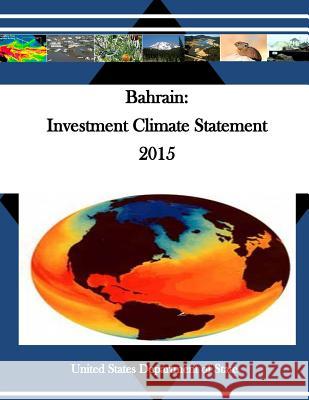Bahrain: Investment Climate Statement 2015 » książka
Bahrain: Investment Climate Statement 2015
ISBN-13: 9781530649822 / Angielski / Miękka / 2016 / 24 str.
The investment climate in the Kingdom of Bahrain is generally good, and has remained relatively stable in the last year. Bahrain has a liberal approach to foreign investment and actively seeks to attract foreign investors and businesses. In an economy largely dominated by state owned enterprises (SOE's), the Government of Bahrain (GOB) aims to foster a greater role for the private sector in economic growth. The efforts focus on encouraging foreign direct investment in Bahrain, including in the information and communications technology (ICT), education and training services, tourism, financial services, business services, healthcare services, energy, and aluminum sectors. The U.S.-Bahrain Bilateral Investment Treaty (BIT) entered into force in May 2001 and the U.S.-Bahrain Free Trade Agreement (FTA) entered into force in January 2006. The BIT provides benefits and protection to U.S. investors in Bahrain, for example, most-favored nation treatment, the right to make financial transfers freely and without delay, international law standards for expropriation and compensation cases, and access to international arbitration. The BIT guarantees national treatment for U.S. investments across all sectors, with very few exceptions. American firms interested in selling products exclusively in Bahrain are no longer required to appoint a commercial agent. Bahrain allows 100 percent foreign-ownership of new industrial entities and the establishment of representative offices or branches of foreign companies without local sponsors. Under the U.S.-Bahrain FTA, Bahrain is committed to enforcing world-class Intellectual Property Rights (IPR) protection. Despite the GOB's transparent, rules-based government procurement system, U.S. companies have reported operating at a perceived disadvantage compared with other firms in certain government procurements. Some businesses report contracts are not always awarded solely based on price and technical merit. Many ministries require firms to pre-qualify prior to bidding on a tender, often rendering firms with little prior experience in Bahrain ineligible to bid on major tenders. U.S. firms sometimes report perceived high-level corruption is an obstacle to foreign direct investment. Petty corruption, however, is relatively rare in Bahrain. The bureaucracy is sometimes inefficient, but generally honest. Giving or accepting a bribe is illegal, although relevant laws are enforced with some degree of inconsistency. In February 2011, a period of political and civil unrest began in Bahrain. While the situation today is quite different and far more stable than in 2011, demonstrations continue to occur, occasionally developing into violent clashes by demonstrators against police. These violent clashes, when they occur, sometimes make travel in and around parts of Bahrain potentially dangerous. There are no indications that Westerners or U.S. citizens are being targeted directly, but there have been isolated incidents in which protesters voiced anti-U.S. sentiments and burned U.S. flags. The unrest has had a limited impact on American businesses in Bahrain. The Kingdom of Bahrain held Parliamentary elections in November 2014, during which the business community played an active role. These were the first elections held since constitutional reforms enacted in 2012 gave the legislative branch powers to discuss and approve a Government Action Plan (GAP). In February 2015, the newly-elected parliament approved the 2015-2018 GAP, which included plans to build 25,000 housing units, additional infrastructure development, and minor health care reforms.
Zawartość książki może nie spełniać oczekiwań – reklamacje nie obejmują treści, która mogła nie być redakcyjnie ani merytorycznie opracowana.











